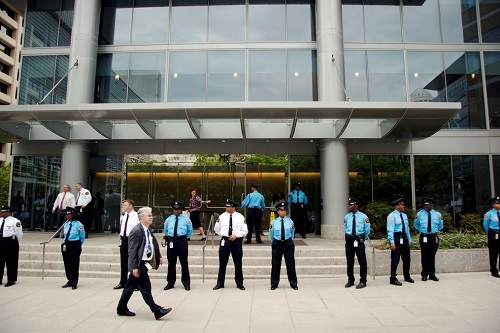mjb photo
By
Ricardo Swire
The security industry is vital in today’s world, especially since crime and terrorism have mushroomed. Private Security Companies (PSCs) provide armed and unarmed services for an agreed price to private and public sector clients. A PSC’s duty is to provide security related services such as prevention of unauthorized activity or entry in a specified perimeter, traffic regulation, access control, fire, theft prevention and detection, such services officially described as “the protection of personnel and/or assets.” PSCs also offer roving patrol, bodyguard and K-9 services.
During the last decade CARICOM’s private security industry has grown expeditiously. Today PSC employees outnumber law enforcers. CARICOM’s regulatory regime of legislation, regulations and State directed bodies managing PSCs, has fallen behind rapid private security industry growth and modernization. Caribbean internal security intelligence studies on St. Lucia, Trinidad & Tobago and Jamaica noted some PSC owned firearms are “rented out,” used in commission of crimes, or sold to gang members.
Globally national laws, governing use and operation of Private Military and PSCs, differ in scope and complexity. The Geneva Centre for Democratic Control of Armed Forces (DCAF), supported by Switzerland’s Ministry of Foreign Affairs, established the Private Security Regulation.net website that attempts to regulate “Private Military” and “Security Companies” or PMSCS activity. Client demographic and psychographic composition criss-cross public and private sector, as well as residences of different social classes. DCAF joined forces with the Sie Cheou-Kang Centre for International Security & Diplomacy to rollout the “Private Security Monitor web portal listing various national Private Security regulations, laws, reports and documents.
2013 accounting statistics showcased examples of PSCs lucrative financial rewards. Heavyweight G4S based in the United Kingdom (UK) made US$12 billion. Securitas AB headquartered in Sweden generated US$10.2 billion and ADT Corporation in America earned US3.31 billion. Formal national PSC regulations have been elusive. Organized criminal syndicate growth also triggered a PSC numbers increase. Violence inspired by drugs trafficking and crimes committed by “Maras” and “Pandillas” in El Salvador, Guatemala and Honduras or the “Northern Triangle” constantly confront government’s internal security forces.
Drug traffickers are empowered. Reports estimated fourteen cargo containers are stolen weekly in Honduras, Guatemala losing ten and El Salvador eight. Crime assaults boost PSC popularity. Numbers project eight percent annual growth. More than two hundred thousand PSC officers work across Central America, most perform informal duties. PSC staff in Guatemala outnumbers the twenty-four thousand domestic law enforcers four to one. Honduras’ twenty-nine thousand police personnel are doubled by private security officers.
A pressing regional PSC regulatory challenge is the “legal technicality” in Latin America. The loophole prevents the National Civil Police (PNC) of El Salvador from holding domestic PSCs accountable. Not long ago the PNC sanctioned one PSC for failing to report stolen/misplaced firearms and contradictory records. The security entity appealed on the basis of an “illegitimate fine.” The counter-argument detailed how the financial penalty breached “principles of legal security,” due to the Private Security Services Law’s “non existence of general regulation.”
Caribbean internal security intelligence analysts identified four hundred and fifty similar Salvadorian PSCs that function without renewed authorization documents. The hallmark of unregulated PSCs, motivated solely to protect rich clients. Salvadorian legislation dictates PSCs are subject to sanctions. Minor infractions incur fines varying from two to ten percent of minimum wage. Serious offences attract penalties of eleven to sixty percent of minimum wage. Notwithstanding, the domestic law is ambiguous about whether minimum wage is tied to the business, service or industry sectors.
Ricardo Swire
Ricardo Swire is the Principal Consultant at R-L-H Security Consultants & Business Support Services and writes on a number of important issues.



No Comments Yet!
You can be first to comment this post!